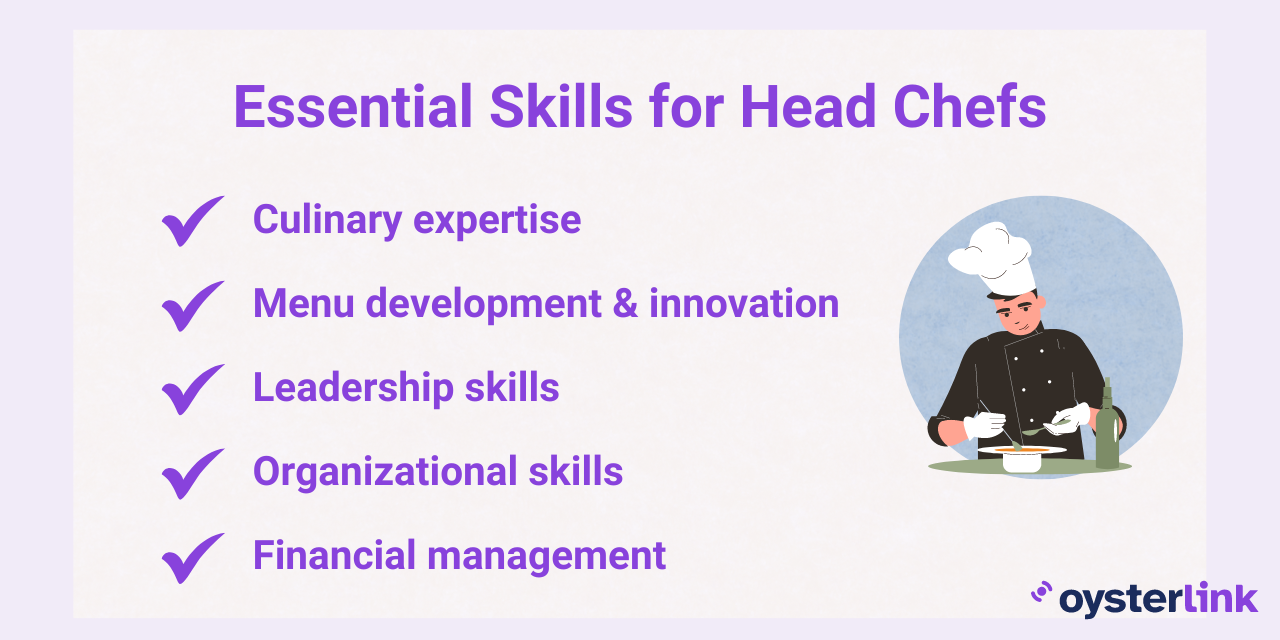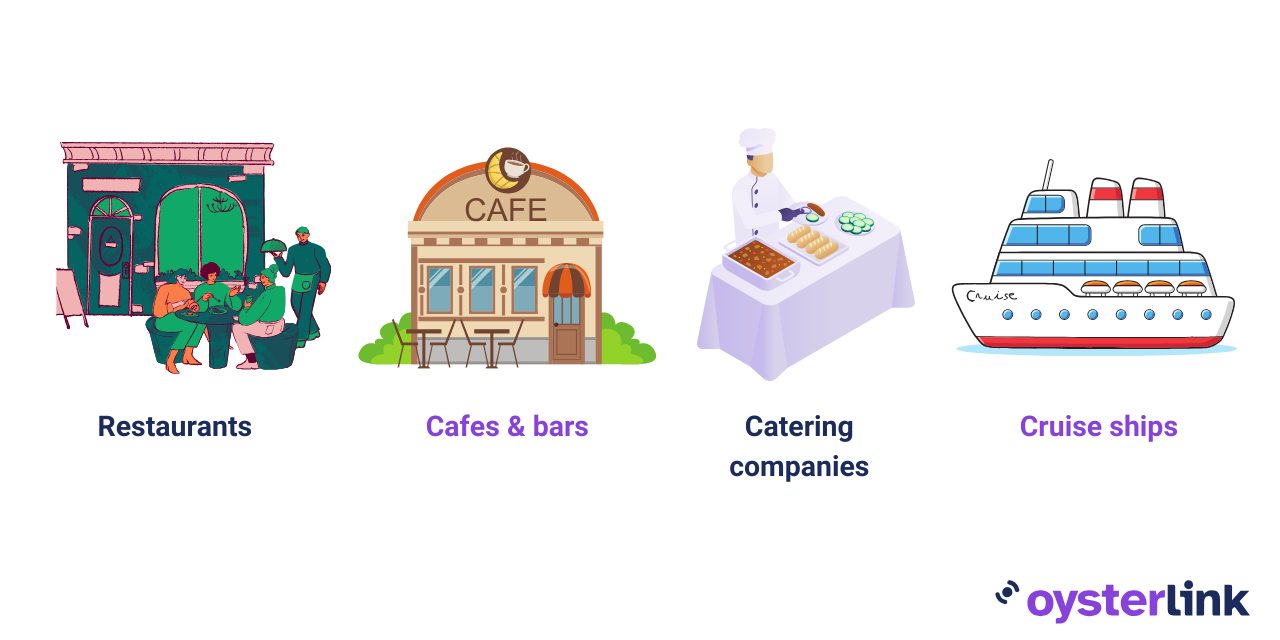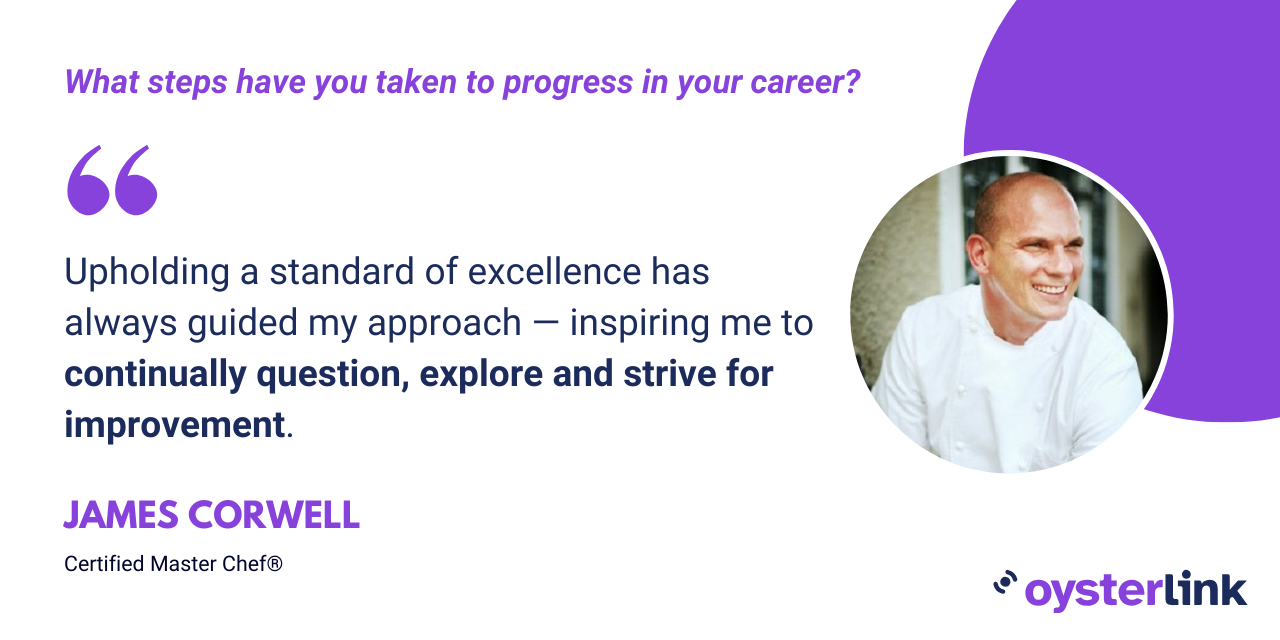If you’re setting your sights on eventually becoming a Head Chef, then you came to the right place.
We’ve prepared this Head Chef Career Guide to help you learn more about what it takes to reach this role and thrive in it. This guide covers key information such as the primary responsibilities, work environment, education and training requirements and skills needed to succeed.
What Is a Head Chef?
A Head Chef (alternatively called a Chef de Cuisine, Executive Sous Chef or Master Chef) is in charge of the entire back-of-house operations of a restaurant. As such, they oversee every kitchen staff member — from Dishwashers and all the Cooks to the Sous Chef.
Head Chefs typically hold the highest position within a kitchen. However, there are also some establishments where they report directly to the Executive Chef.
What Does a Head Chef Do?
Although a Head Chef’s day-to-day tasks vary depending on their workplace, here are the primary responsibilities of most Head Chefs.
- Approve every dish prepared to ensure their quality before being served to customers
- Spearhead the development of new menu items or the updating of existing ones to maintain customer satisfaction
- Oversee the hiring and managing of all kitchen staff – including shift schedules, payroll records and training
- Ensure staff’s adherence to all back-of-house operational processes and systems, including government rules on food safety and sanitation
- Collaborate with the Director of Restaurant Operations or the Restaurant Manager to optimize food and other kitchen-related costs and maximize the establishment’s revenue
- Coordinate with suppliers and vendors for ingredients and kitchen equipment to ensure timely delivery and a steady inventory level
- Ensure that all kitchen equipment are working properly and arrange for repairs whenever needed
- Maintaining an efficient, collaborative work environment and resolving conflicts among kitchen staff whenever necessary
Visit our Head Chef Job Description page for a more detailed list of duties and responsibilities.
Top 5 Skills for Head Chefs
Head Chefs must develop and refine a wide range of skills to thrive in their role.

Now, let’s take a look at each of these five skills every Head Chef should have.
1. Culinary expertise
Culinary expertise is a fundamental skill for every Head Chef, as they are responsible for guiding all kitchen staff members and fostering a culture of excellence.
That said, Head Chefs must possess advanced culinary skills. This includes having a mastery of cooking techniques, proficiency in flavor profiles and ingredients and a good eye for food presentation.
2. Menu development and innovation
Head Chefs should also be able to create and execute a variety of innovative menu items. This is especially true for those who work in dining establishments where they have more creative freedom.
From desserts and appetizers to main dishes, a talented Head Chef knows how to create and adjust menu items that cater to diverse preferences and reflect culinary trends.
Additionally, they need to curate dishes that complement each other, ensuring that the entire menu is cohesive and balanced.
3. Leadership skills
Proper leadership skills are essential for Head Chefs to inspire, motivate and manage their kitchen staff. This skill set includes effective delegation, proactive problem-solving, agile decision making and the ability to navigate unexpected issues.
Head Chefs should also cultivate a work environment that promotes collaboration and accountability, which entails leading by example.
In the video above, the renowned Anthony Bourdain discusses some of the most important leadership insights he gained throughout his extensive Chef career.
4. Organizational skills
Head Chefs with strong organizational skills are good at time management, multitasking and setting goals.
Moreover, they must have a keen attention to detail, ensuring that each food the restaurant serves is consistently of high standards. This includes overseeing all aspects of kitchen operations, from ingredient sourcing and food preparation to the presentation of menu items.
The video above shows how an NYC-based Chef manages tasks and maintains efficient kitchen operations throughout the day.
5. Financial management
Head Chefs must balance their culinary expertise and innovation with financial skills. After all, they are one of the main people in charge of managing a restaurant’s food-related expenses.
Beyond creating top-notch dishes, an excellent Head Chef has a good understanding of budgeting, inventory management and cost-control measures.
How To Become a Head Chef
Now that you have a clearer understanding of what a Head Chef does, your next question might be — “How can I become one?”
Below are some key points to guide you in working towards reaching this high-level position within the culinary industry.
Education & Training Requirements for Head Chefs
Head Chefs often need extensive culinary training and education, given that they hold a leadership role.
The typical education and training requirements for Head Chefs include:
- High school diploma or GED: This is often the minimum level of educational attainment for Head Chef jobs, as it demonstrates fundamental literacy and mathematical and communication skills.
- Supervisory or managerial experience: Head Chefs hold a high level of responsibility and therefore must have previous experience in a managerial or supervisory role. The minimum requirement ranges between two and five years, depending on the employer.
- Culinary degree or diploma: Having a formal culinary education can give Head Chefs a significant advantage in their career development and advancement. However, it is not a strict requirement in some establishments and companies.
- Professional certifications or courses: Whether or not they have prior culinary education, a Head Chef can also attend relevant courses or certificate programs to boost their credentials. Moreover, completion of such programs or courses demonstrates a Head Chef’s dedication to ongoing learning and development – which are essential qualities for those in management positions.
Courses and Certifications for Head Chefs
Here are some of the most reputable organizations and institutions that offer courses and certifications for Head Chefs.
| Organization/Institution | Course/Certification | Description |
|---|---|---|
| Institute of Culinary Education (ICE) | Advanced Culinary Studies | A set of multi-day and single-day classes ranging from contemporary cuisine techniques to seasonal fine dining; all held on ICE’s NYC campus |
| Harvard Online | Professional Certificate in The Science of Cooking | A three-part certification program focusing on food science principles and their application in everyday cooking |
| American Culinary Federation | Certified Chef de Cuisine® | A certification program geared towards food production supervisors (such as Head Chefs) within food service operations; valid for up to five years |
| Kitchen CUT | Financial Management Course for Professional Chefs | A seven-part online course covering topics such as food costing, margin analysis and menu engineering |
| ServSafe | ServSafe Manager Food Safety Certification | Covers food safety practices and various state-specific regulations; valid for up to five years |
Head Chef Salary and Earning Potential
On average, Head Chefs working in the United States earn an annual salary of $73,632. However, their actual earning potential depends on which state they work in.
The map below shows an overview of the average salaries for Head Chefs across the country:
[Calculated using Indeed, Talent.com, Salary.com and ZipRecruiter data]
This map is interactive. Hover your mouse over different parts of the map to see detailed data.
A Head Chef’s overall earning potential may also be determined by other factors like their level of experience and other parts of their compensation package. Check out our Head Chef Salary Guide where we cover these factors in further detail.
Head Chef Career Progression
The progression chart below shows which job roles you need to take before becoming a Head Chef. At the same time, it includes which higher-level positions to which Head Chefs can advance.
Where Do Most Head Chefs Work?
Head Chefs work across different types of establishments and companies within the restaurant and hospitality industry. In each of these, they manage all aspects of kitchen operations, from menu planning and preparation to staffing.
Let’s take a look at the most common workplaces for Head Chefs.

A Head Chef could work in various types of restaurants, from casual establishments to fine dining concepts. Here, they create menu items that are in line with the restaurant’s culinary standards and brand identity.
In some restaurants, the Head Chef may also interact with guests to answer questions about the menu or particular dishes.
On the other hand, Head Chefs in cafes and bars often collaborate with Baristas and Bartenders to ensure that food items pair well with specific types of beverages. In some establishments with a “cafe by day, bar by night” concept, a Head Chef might have to prepare two or more menus for different service periods.
In catering companies, Head Chefs have the opportunity to travel and work in different settings like weddings, conferences and even film sets. That said, they constantly need to adapt menus to each client’s requirements and preferences. Also, they might have to work with relatively limited resources especially if there is no on-site kitchen.
Head Chefs on cruise ships may also get to visit various destinations while working. During their shifts, they help integrate culinary services with onboard activities or services — such as themed nights, live performances and private dining.

In hotels and resorts, a Head Chef is typically responsible for the kitchen operations of a particular dining outlet. Similar to Head Chefs on cruise ships, their responsibilities may also include overseeing menu planning and food preparation for banquets, room service and special events. That said, they work closely with Hotel Managers to ensure a memorable guest experience.
Meanwhile, private clubs and lounges present a more upscale work environment for Head Chefs. Here, they must develop menu items that cater to the needs and expectations of a higher-end clientele. In some cases, the Head Chef may also hold culinary demonstrations or degustation dinners to engage with club members.
Head Chefs in sports and entertainment venues work with a diverse range of food items, from staple snacks like hotdogs and burgers to more gourmet options. They may be in charge of food service for all concession stands within the venue or specific sections such as VIP suites.
Cafeterias in office buildings and schools may also hire a Head Chef to develop daily menus and oversee the preparation of meals and snacks for employees, students and faculty members. The Head Chef must ensure that the cafeteria’s offerings align with the nutritional requirements and dietary restrictions of regular customers.
Head Chef Career: Pros and Cons
As with any job, working as a Head Chef has its own advantages and challenges. Below are some of the most common pros and cons of this role.
Pros:
- Creative freedom: Given their high-level role within the kitchen, Head Chefs typically have more creative freedom compared to other staff members. They have the authority to develop new recipes, finalize the overall menu and approve dishes before they are served.
- Leadership development: Head Chefs manage day-to-day kitchen operations, which involves overseeing all back-of-house staff. This gives Head Chefs plenty of opportunities to hone their leadership skills in preparation for higher-level positions within the restaurant industry.
- Higher pay and more recognition: Head Chefs typically receive higher salaries and more comprehensive benefits than other kitchen staff. Additionally, they may receive recognition from their employers and customers more frequently whenever the staff produces high-quality dishes.
- Travel opportunities: This is especially applicable to Head Chefs who work for cruise lines or event and catering companies. However, even Head Chefs in other companies or establishments have the opportunity to travel for work-related purposes like culinary conventions, competitions and further training at a company’s overseas headquarters.
Cons:
- Higher chances of burnout: Head Chefs often have a more demanding schedule that involves longer and irregular hours (including holidays, weekends, early mornings and late nights). Additionally, they work in a fast-paced, high-temperature kitchen environment while doing physically challenging tasks. All these could lead to poor work-life balance and cause burnout.
- Adjusting to a leadership role: This especially applies to Head Chefs with no prior experience in this specific role yet. Being a new Head Chef may feel daunting due to the higher level of responsibility and the need to balance more tasks than in their previous positions.
- Challenges in kitchen operations: A Head Chef ensures the smooth functioning and overall success of a dining establishment’s back of house. Therefore, they must constantly navigate various kitchen-related challenges such as rising food and supply costs, order delays or errors, diverse customer preferences and staff turnover.
- Constant competition: Head Chefs work within the highly competitive culinary industry, where consumer preferences and dining trends are constantly changing. That said, a Head Chef must adapt to these changes, keep up with their competitors and ensure the establishment’s continual success — all of which may put them under a lot of pressure.
Quiz: Is Head Chef the Right Role for You?
Wondering whether you have what it takes to be a Head Chef someday? Try out our quiz below!
Results
Congratulations!
Based on your responses, it seems like a career as a Head Chef would be an excellent fit for you. Your skills and preferences align well with the demands of the profession.
Embrace this opportunity, and consider exploring further training or gaining more experience to enhance your culinary leadership abilities. Check out our list of high-paying Head Chef Jobs.
Cheers to a promising future in the culinary industry!
There’s great potential!
While your results indicate that a Head Chef role may not be an immediate perfect match, there’s potential for you to excel with dedication and focused effort.
Consider investing some time in improving your skills by taking culinary courses or applying for junior-level culinary jobs like Line Cook.
#1. Which type of work environment do you prefer?
#2. What is your approach to training Sous Chefs and other junior Chefs?
#3. What would you do if a Server notifies you that a customer is complaining about a dish being undercooked, even though it was prepared correctly?
#4. What would you do if there’s a last-minute order for a dish that requires a special ingredient you don’t have in stock?
#5. How do you ensure that all kitchen staff members adhere to food safety and sanitation protocols?
#6. How do you handle conflicts or disagreements among your kitchen staff members?
#7. What would you do if a Sous Chef called in sick less than an hour before a busy Friday night shift?
#8. Do you think it’s important to stay updated on culinary and dining trends even when one is already a Head Chef?
#9. How would you manage a budget for a VIP event that requires a special menu?
#10. Do you believe it’s possible to ensure consistent quality and presentation for every dish served in a high-volume restaurant?
A Top-Level Chef Shares About His Experience
To wrap things up, here’s a piece of advice from James Corwell for every Chef aiming to advance within the restaurant industry.

Head Chef Career FAQ
Most employers require Head Chef applicants to have around two to five years of leadership or management experience. This means that an applicant must have either worked as a Head Chef previously or at least as a Sous Chef or Kitchen Manager.
It depends on the establishment’s organizational structure.
Usually, in restaurants with smaller operations, the Head Chef holds the highest position. On the other hand, in larger and/or more upscale establishments, they often act as second-in-command to an Executive Chef.
Yes. Even though these two culinary job titles are often used interchangeably, they aren’t necessarily the same.
For a better overview of the similarities and differences between these two roles, check out this Spotlight article.
Sometimes, yes. In some establishments or companies, a Head Chef may also be referred to as a “Chef de Cuisine,” “Master Chef” or “Executive Sous Chef.”
That said, you should carefully read through the entire job ad to ensure that you’re actually applying for a Head Chef position. It’s also best to clarify with the recruiter or hiring manager during your job interview.
Most Head Chefs work full-time and on early mornings, late evenings, weekends and holidays. Although 40 hours is the standard for many full-time jobs, a Head Chef may need to work longer hours, given their level of responsibility.
Yes, they do — but definitely not as often as junior-level Chefs and Cooks. This is because the Head Chef’s duties and responsibilities go beyond just cooking.
In many cases, Head Chefs may only need to cook whenever there is a staff shortage.


